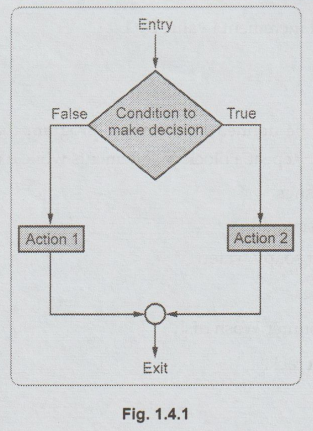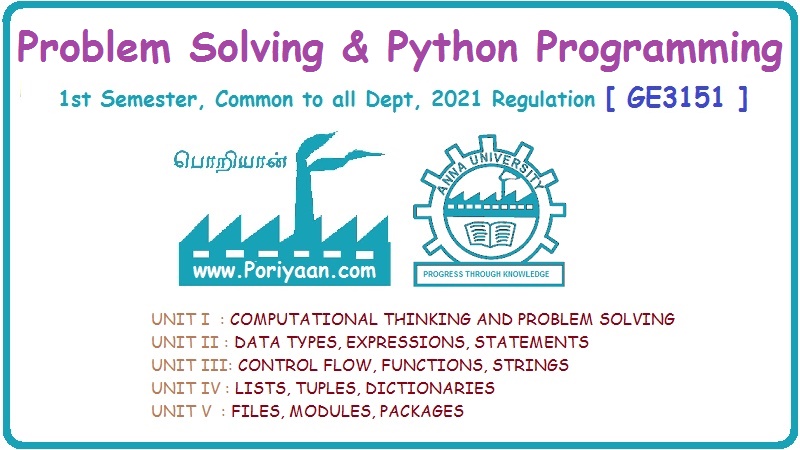Problem Solving and Python Programming: UNIT I: Computational Thinking and Problem Solving
Building Blocks of Algorithm
Algorithm is basically a sequence of instructions written in simple English language. The algorithm is broadly divided into two sections -1) Heading Section and 2) Body Section
Building Blocks
AU
: Dec.-19, Maks
•
Algorithm is basically a sequence of instructions written in simple English
language. The algorithm is broadly divided into two sections -1) Heading
Section and 2) Body Section
•
Algorithm
is a procedure consisting of heading and body. The heading consists of keyword Algorithm
and name of the algorithm and parameter list.
•
Then
in the heading section we should write following things :
#Problem
Description :
#Input
:
#Output
:
•
Then body of an algorithm is written, in which various programming co for,
while or some assignment statements may be written.
•
Algorithmic body consists of basic building blocks such as Simple
Statements, Control Flow Statements and Functions
(1)
Simple Statements
•
The simple statements consists of assignment statements, input/output
statements and comment statements.
•
Using assignment operator ← an assignment statement can be given.
For
instance :
Variable
← expression
•
There are other types of operators such as Boolean operators such as true or
false. Logical operators such as and, or, not. And relational operators
such as <, < =, >, > =, =
•The
array indices are stored with in square brackets '[' ']'. The index of array
usually start at zero. The multidimensional arrays can also be used in
algorithm. The inputting and outputting can be done using read and write.
For
example:
write("This
message will be displayed on console") ;
read(val);
•
The comment statemement is non executable statement. It provides additional
information
about the programming statement. In Python the comment is specified using #
(2)
Control Flow Statements Control flow :
The
process of executing the individual statements in a given order is called
control flow.
The
control can be executed in three ways
1.
Sequence 2. Selection 3. Iteration
a.
Sequence :
All
the instructions are executed one after another is called sequence execution.
This describes a sequence of actions that a program carries out one after
another, unconditionally.
Execute
a list of statements in order.
Example
:
Add
two numbers:
Step
1:
Start
Step
2:
get a,b
Step
3:
calculate c=a+b Step 4: Display c
Step
5:
Stop
b.
Selection :
Selection
is the program construct that allows a program to choose between different
actions. Choose at most one action from several alternative conditions.
A
selection statement causes the program control to be transferred to a specific
part of the program based upon the condition.
If
the conditional test is true, one part of the program will be executed,
otherwise it will execute the other part of the program.

Algorithm
to find biggest among 2 numbers :
Step
1 :
Start
Step
2: Get
two numbers as input and store it in to a and b Step
Step
3:
If a is greater than b then
Step
4:
Print a is big
Step
5:
else
Step
6:
Print b is big
Step
7:
Stop
c.
Iteration :
In
some programs, certain set of statements are executed again and again based
upon conditional test. i.e. executed more than one time. This type of execution
is called looping or iteration
Example
Write
an algorithm to print all natural numbers up to n
Step
1:
Start
Step
2:
get n value.
Step
3:
initialize i=1
Step
4:
if (i<=n) go to step 5 else go to step 7
Step
5:
Print i value and increment i value by 1
Step
6:
go to step 4
Step
7:
Stop
Repetition(loop)
may be defined as a smaller program that can be executed several times in a
main program. Repeat a block of statements while a condition is true.
Algorithm
for Washing Dishes
Step
1 :
Stack dishes by sink.
Step
2:
Fill sink with hot soapy water.
Step
3:
While moreDishes
Step
4:
Get dish from counter,Wash dish
Step
5:
Put dish in drain rack.
Step
6:
End While
Step
7:
Wipe off counter.
Step
8:
Rinse out sink.
Algorithm
to calculate factorial no :
Step
1:
Start
Step
2:
Read the number num.
Step
3:
Initialize i is equal to 1 and fact is equal to 1
Step
4:
Repeat step 4 through 6 until i is equal to num
Step
5:
fact=fact * i
Step
6:
i=i+1
Step
7:
Print fact
Step
8:
Stop
(3)
Function
The
Function is a programming constructs used for giving a name to a piece of
coding. This piece of code is referred as function body.
When
the name of the function is called, the body is executed. Each execution of the
body is called activation of that body.
The
function can be called from expression. For example -
total=amount+Calculate(interest);
In
above expression the function Calculate is called.
Syntax
of function
<function-name>(<parameter-list>)
Elements
of Function
Various
elements of function are –
1.
Name for declaration of function
2.
Body consisting of local declarations and statements
3.
Formal parameters which are the placeholders of actuals
4.
Optional result type.
For
example : Consider following C code

int
a,b; int c; a = 10;
Fig.
1.4.2 Example for use of function
Review Question
1. Discuss about the building blocks of algorithms. AU : Dec.-19, Marks 8
Problem Solving and Python Programming: UNIT I: Computational Thinking and Problem Solving : Tag: Engineering Python : - Building Blocks of Algorithm
Related Topics
Related Subjects
Problem Solving and Python Programming
GE3151 1st Semester | 2021 Regulation | 1st Semester Common to all Dept 2021 Regulation
